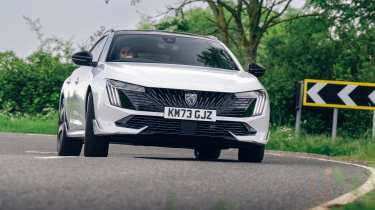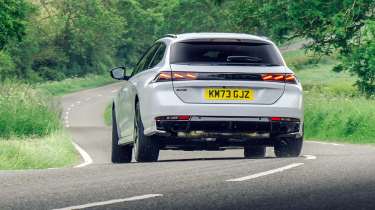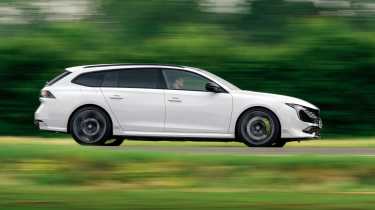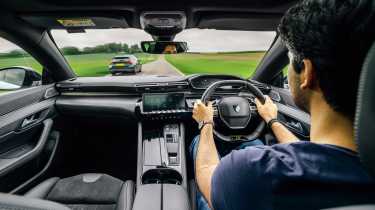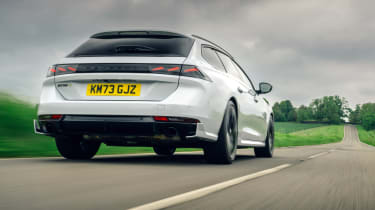Peugeot 508 PSE (2021 - 2024) review – performance hybrid is a foil for S4 and M340i
355bhp petrol-hybrid 508 from Peugeot Sport Engineered has Audi’s S4 licked
As its arch rival Renault made its exit from traditional blue-collar performance cars before reappearing under the Alpine name as a pure electric performance division, Peugeot stole its thunder in 2020 with the Peugeot Sport Engineered (PSE) programme, showcased in its first road car, the 508 PSE.
Benchmarked against Audi’s mild-hybrid diesel S4 and Volvo’s V60 Polestar with aspirations of competing with Mercedes’ latest C-class hybrid models and BMW’s class leading M340i XDrive, the 508 PSE didn't shy away from the competition. And it didn't need to, because at a first attempt PSE has produced a hugely compelling package, one that makes the S4 feel leaden and uninspiring, the V60 Polestar the woeful box that it is and, while not on a par with an M340i, it doesn’t embarrass itself.
> New Peugeot performance cars are coming, and they’ll be ‘extremely agile and fun to drive’
Engine, transmission and 0-60mph time
Core to the hybrid drivetrain is Peugeot’s 1.6-litre, turbocharged four-cylinder engine, which impressed so much when experienced in the under the radar, but class leading 208 and 308 GTI by Peugeot Sport hot hatches. In the 508 PSE it develops 197bhp and 221lb ft of torque with the former arriving at 6000rpm, the latter at half that engine speed.
More reviews
Coupled to this is a pair of electric motors, one on the front axle integrated into the eight-speed eEAT8 automatic gearbox driving the front wheels and producing 109bhp with an additional 111bhp motor driving the rear axle. The front motor also produces a thumping 236lb ft from 500rpm through to 2500rpm, with the rear providing an additional 122lb ft from zero revs to 4760rpm.
In terms of outright power and torque it’s not a case of combining all of the outputs and marvelling at a D-segment saloon producing 911 Turbo levels of power and torque. Instead, the maximum cumulative peak power figure is 355bhp with an accompanying 386lb ft.
There is drive to all four-wheel wheels, although the front and rear axles aren’t connected, up to 118mph when the front wheels take control, with the headline performance figures of 5.2-seconds from a standstill to 62mph and a limited top speed of 155mph.
The electric components of the drivetrain include a 11.5KWh lithium ion battery (the limiting factor to peak power, restricting energy draw to a maximum 158bhp from both motors), which provides an electric range of up to 26 miles up to speeds of 86mph, and electric drive favours the rear axle where possible.
Technical highlights
Underpinning the 508 PSE is Peugeot’s interpretation of a MacPherson strut with coil springs, the rear suspension consisting of a multi-link set-up. Three-mode variable dampers are also fitted (comfort, hybrid and sport) to suit the five driving modes that are also available.
Unique to the 508 PSE are wider front and rear tracks, with the longer wishbones fitted at the front resulting in an additional 24mm with spacers accounting for a 12mm increase at the rear. Negative camber has also been increased and the anti-roll bars are unique to the car.
Alcon has supplied the 380mm ventilated front discs and four-piston calipers (as well as the solid rear discs and two-piston calipers) on the front axle and the 20-inch wheels are fitted at all four corners with Michelin’s excellent Pilot Sport 4S tyres.
There are five driving modes: Electric mode allows you to travel up to 26 miles if the battery is fully charged at speeds of up to 86mph; Comfort mode mixes the hybrid powertrain with the softest suspension setting; Hybrid mode determines which power source is best for the circumstances you face, Sport is where you will find the full 355bhp. In Sport mode the steering weight is also increased, the dampers are stiffer and the throttle map switches to a sharper setting. Sport also generates the highest level of battery regen to keep the electric power coming. The fifth mode is badge ‘4WD’ and tuned for maximum traction in slippery conditions.
In terms of charging, a depleted battery will take seven hours using a household 13-amp socket, four-hours if you have a 16 amp supply and less than two hours if you have a 32 amp charging supply.
What’s it like to drive?
Start your journey with a fully charged battery, or any level of electric power and the 508 PSE is as calm and serene as any car running on electric power. Being a hybrid there’s less electric motor whine than a pure EV, which some might miss as part of the theatre but there’s little else to report.
Throttle response is instantaneous as you’d expect, with the 508 doing well to hide its 1875kg, although once above 30mph that serious shove morphs into a push as the speed rises and physics take over. It’s incredibly smooth to operate, with no jerkiness to the delivery that can afflict some hybrids, but it’s how PSE has integrated the electric motors with the turbocharged engine that demonstrates where the time and engineering has been focussed.
When the 1.6 is required to take over the transition is impressively seamless, there’s no flare of revs or kickback as one powersource replaces another. It’s another layer of quality that adds to the measured level the PSE operates to, especially when you begin to push at those Sport Engineered credentials.
French cars have always had a flow to their dynamics that allows a lowly specced family saloon to keep a performance car honest on a road that bucks, twists, dips and crests with the worst of them. Throw in cracked surfaces and potholes you can swim in and a well driven modest French saloon car can often power on through where others sink. The 508 PSE takes this ability to truly Olympic levels.
On the well driven test routes that evo uses that circle its office you very quickly catch yourself travelling at speeds and committing to a course at a far higher rate of knots than you anticipated. Not because the car feels aloof and you are totally unconnected from it, but because it relaxes you and encourages you to enjoy the flow. It’s an effortless way to travel quickly in the most unlikely of cars.
Yes, the electric steering lacks feel and the weighting can be inconsistent, but it’s precise and its rate of response is measured and linear, coming together to allow you to enjoy more of the performance than you ever imagined you would.
Much of this is down to how it rides, smothering bumps, smoothing imperfections and filtering out the harshness to leave you a good level of body control to lean on when required that’s also capable of absorbing the unexpected at the very last minute.
There’s plenty of grip from the Michelins, that are accompanied by an unexpected level of finesse from the chassis when you start to take advantage of the calmness and composure of the ride. It tightens its line neatly rather than snapping back on course when you need it to, but when in its sweet spot there’s a calmness to everything it does.
Sound perfect? The 508 PSE has some marks in the negative column. Its eight-speed automatic gearbox is the drivetrain’s weak link, it’s often caught between gears or can be indecisive when deciding which ratio you need. And if you use the paddles the shift speeds aren’t quick enough to avoid catching the limiter or a downshift arriving a few metres after you really wanted and needed it. And the 1.6-litre engine, despite its responses and performance it lacks the smoothness ad polish of BMW’s engines.
Other gripes? Peugeot’s i-Cockpit is still poor to use – and the sooner Peugeot ditches it and the ill-proportioned and poorly positioned steering wheel-instrument cluster, the better. And while the 508 is a really strong design, especially so in SW guise (the most popular of the 508’s two body styles) it’s only available in grey, black or white with black wheels, which strikes us as being a little too bland and unadventurous for a car that is anything but to drive.
Price and rivals
Here comes the tricky bit. £55,025 (for the SW, the Fastback is £53,995) is a strong price for any manufacturer to ask in this segment regardless of the badge, so Peugeot is going to have to work overtime to get bums on 508 PSE seats if they are going to convince people to commit to that level of payment (outright or on a monthly plan).
In terms of the Audi S4 and Volvo V60 Polestar PSE benchmarked, it hasn’t got a worry there as the 508 beats them hands down in terms of how they drive and the innovation they employ, if not in driveway and badge appeal. A BMW M340i XDrive (or M340d) is still the class leader as a driver’s car, by some margin in our book, and even the smaller engined BMW’s have little to worry about, not when the equivalent 330e xDrive M Sport Touring starts at £46,180.

